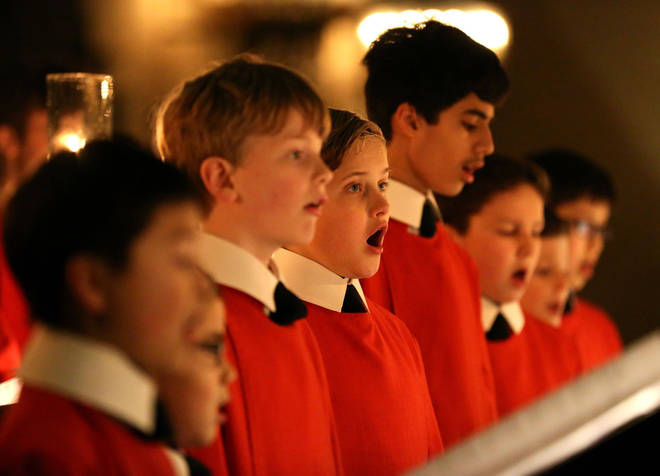Ladies and Gentlemen the Savior Had Come Again
What are the lyrics for 'God Rest Ye Merry, Gentlemen' – and what is the Christmas carol about?
ane Nov 2019, 16:12
'God Residual Ye Merry, Gentlemen' is one of our favourite minor central Christmas carols, merely what are the lyrics about and why don't they all rhyme?
'God Rest Ye Merry, Gentlemen' is one of the oldest Christmas carols there is, and one of the most pop.
The ballad originates from 16th-century England and the earliest known printed edition was published in 1760.
It has been known by different names throughout history, including 'God Bless Yous, Merry Gentlemen' and 'God Rest Ye, Merry Christians', and even makes an advent in Charles Dickens' novel, A Christmas Carol, early on when Scrooge is terrifying carol singers with his foul atmosphere:
"At the offset audio of 'God bless yous, merry gentlemen! May nada you lot dismay!', Scrooge seized the ruler with such energy of action that the vocaliser fled in terror, leaving the keyhole to the fog and even more fraternal frost."
Read more: xxx greatest Christmas carols of all time >

'God Rest Ye Merry, Gentlemen' total lyrics
God rest ye merry gentlemen
Let null you dismay
For Jesus Christ our Saviour
Was built-in on Christmas Twenty-four hour period
To salvage us all from Satan's pow'r
When we were gone astray
O tidings of comfort and joy
Comfort and joy
O tidings of condolement and joy
From God our Heavenly Father
A blessed Angel came;
And unto sure shepherds
Brought tidings of the aforementioned,
How that in Bethlehem was born
The Son of God by Name.
O tidings of condolement and joy,
Condolement and joy
O tidings of comfort and joy
The shepherds at those tidings
Rejoiced much in mind,
And left their flocks a-feeding
In tempest, storm and current of air,
And went to Bethlehem straightway
The Son of God to find.
O tidings of comfort and joy,
Condolement and joy
O tidings of comfort and joy
But when to Bethlehem they came,
Whereat this infant lay,
They establish Him in a manger,
Where oxen feed on hay;
His Mother Mary kneeling down,
Unto the Lord did pray.
O tidings of condolement and joy,
Condolement and joy
O tidings of condolement and joy
At present to the Lord sing praises,
All you within this place,
And with true beloved and brotherhood
Each other now embrace;
This holy tide of Christmas
All other doth efface.
O tidings of comfort and joy,
Condolement and joy
O tidings of comfort and joy.
What is 'God Balance Ye Merry, Gentlemen' most?
Like a lot of well-known Christmas carols, the lyrics (run into below) of 'God Rest Ye' center around the joy experienced at the news of Christ'south nascence – all sung in a cute modest melody.
Built-in on Christmas Day, the Christ the Saviour will "relieve us all from Satan'due south power / When nosotros were gone astray."
The lyrics are wonderfully uplifting and information technology is indeed difficult to experience dismay with those wonderful "tidings of comfort and joy" the carol shares in abundance.
Read more than: All-time Christmas Carols in a minor fundamental >
Why don't all the lyrics rhyme?
Last year, we noticed ballad singers and vexed tweeters were taking to their keyboards to vent over the fact second and forth lines of the tertiary verse of 'God Res Ye' don't rhyme exactly as they should.
It's the carol'due south sheer age that contributes to this.
You run into, back in 16th-century England, some pronunciations were pretty different, attributable to a Not bad Vowel Shift – a series of changes in pronunciation that affected the long vowels used in English language – roughly during the 15th to 18th centuries.
Long vowels shifted upward; that is, a vowel that used to be pronounced in a lower identify in the oral cavity would be pronounced in a dissimilar identify, higher upwards in the mouth. 'current of air' used to be pronounced 'waind', as in 'find'; it had a longer vowel, which was pronounced in a lower place in the mouth to its modern pronunciation.
The Oxford English Dictionary confirms this – that until a few hundred years ago, 'waind' used to be the normal English pronunciation for 'wind' when used in poetry.
Then there you accept information technology.
Source: https://www.classicfm.com/discover-music/occasions/christmas/god-rest-ye-merry-gentlemen-lyrics-meaning/
0 Response to "Ladies and Gentlemen the Savior Had Come Again"
Post a Comment